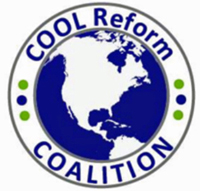 In response to the World Trade Organization’s (WTO) fourth and final ruling on Country of Origin Labeling (COOL) for muscle cuts of beef and pork, the COOL Reform Coalition is calling for “immediate congressional intervention” to bring the U.S. into compliance with its trade obligations and avoid the threat of retaliatory action on the part of Mexico and Canada.
In response to the World Trade Organization’s (WTO) fourth and final ruling on Country of Origin Labeling (COOL) for muscle cuts of beef and pork, the COOL Reform Coalition is calling for “immediate congressional intervention” to bring the U.S. into compliance with its trade obligations and avoid the threat of retaliatory action on the part of Mexico and Canada.
“We flaunt our country’s obligations under the rules-based trading system at our peril,” said U.S. Chamber Senior Vice President for International Policy John Murphy and Co-Chair of the COOL Reform Coalition. “American farmers, workers, and companies will not be able to sell their goods and services to those consumers if we fail to live up to these rules ourselves. Congress must take action now to repeal the COOL rule for meat before retaliation hits as soon as late summer.” Canada has already issued a preliminary retaliation list targeting a broad spectrum of commodities and manufactured products that would affect every state in the country. Mexico has not yet announced a preliminary retaliation list but has implemented retaliatory tariffs in the past which may be indicative of future tariff actions.

 “We have long said that COOL is not just burdensome and costly to cattle producers, it is generally ignored by consumers and violates our international trade obligations,” said National Cattlemen’s Beef Association president Philip Ellis of Wyoming. “Now that the WTO has ruled for a fourth time that this rule discriminates against Canadian and Mexican livestock, the next step is retaliation by Canada and Mexico. Retaliation will irreparably harm our economy and our relationships with our top trading partners and send a signal to the world that the U.S. doesn’t play by the rules. It is long past time that Congress repeal this broken regulation.”
“We have long said that COOL is not just burdensome and costly to cattle producers, it is generally ignored by consumers and violates our international trade obligations,” said National Cattlemen’s Beef Association president Philip Ellis of Wyoming. “Now that the WTO has ruled for a fourth time that this rule discriminates against Canadian and Mexican livestock, the next step is retaliation by Canada and Mexico. Retaliation will irreparably harm our economy and our relationships with our top trading partners and send a signal to the world that the U.S. doesn’t play by the rules. It is long past time that Congress repeal this broken regulation.”
“Unless Congress acts now, Canada and Mexico will put tariffs on dozens of U.S. products,” said National Pork Producers Council President Ron Prestage of South Carolina. “I know tariffs would be financially devastating for the U.S. pork industry, and I’m sure they’ll have a negative impact on a host of other agricultural and non-agricultural sectors.”
 The National Farmers Union (NFU) remains supportive of the law and hopeful that all parties can “negotiate an acceptable path forward.”
The National Farmers Union (NFU) remains supportive of the law and hopeful that all parties can “negotiate an acceptable path forward.”
“As we have seen in other disputes, once decisions are handed down, WTO members often work together to find a solution that will work for them,” said NFU President Roger Johnson. “In this case, such a solution must involve continuation of a meaningful country-of-origin labeling requirement.”
“Congress may well have a role to play once the administration has worked with our trading partners following today’s decision if a statutory modification is deemed warranted by the administration, but the time for action is not now,” Johnson said.
